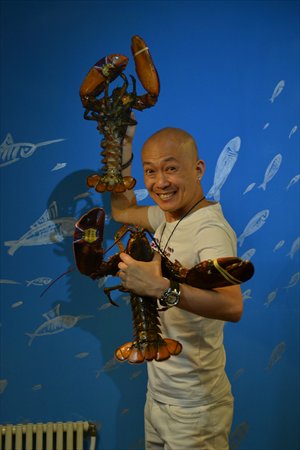Master of lobster
Famous chef Lu Wentao shares his secret to success

Lu Wentao Photo: Courtesy of Lu Wentao
People like to call him "Lobster Luke" due to his delicious lobster platters. Lu Wentao (Luke Lu), 47, currently owns two restaurants in Beijing and is also a management leader as well as a member on the boards of several businesses in the increasingly app-led Chinese catering industry. With his single earring and several rings on his fingers, Lu looks more like an artist than a chef.
Experienced Sichuan cook
Opening up the giant menu at Lu's Lobster House, you can find all kinds of fusion dishes made from lobster such as Vietnam wraps, Mexican nachos, Japanese sashimi, pepper lobster, Spanish paella and of course everyone's favorite Sichuan spicy lobster. Even desserts have some added lobster blood as one of their ingredients, though you wouldn't notice unless someone told you.
Lu's obsession with lobsters is not the only reason he has become a star in this industry, his experience is also a very appealing asset that has attracted quite a bit of media attention.
Graduating top of his class from Sichuan Culinary Academy in 1988, Lu came to work at the five-star Chengdu Grand Hotel. As a determined and hardworking apprentice he quickly made his way to the top. For about a decade, Lu was not only the head chef at the hotel but also ran his own restaurant and worked as a part time teacher at his alma mater.
"The academy is known as the 'Huangpu Military Academy' of Sichuan Cuisine. We had 40 students that year and we were the best in town which meant we got to choose where we wanted to work," Lu told the Global Times.
In the early 1990s, Lu's life in Chengdu was what many would consider a dream. The first time he brought his paycheck home to his mother, she was shocked since she had never seen such an amount before. Lu bought himself a Nissan Bluebird, telling people who asked that it was a gift from his uncle in the US.
Lu's uncle owned three successful restaurants called Great Wall in Hollywood. On a trip back to Chengdu Lu's uncle asked him if he wanted to go to the US, a proposition that Lu wasn't very interested in at first. "But my father is a wise man. He encouraged me to go and have a look," said Lu.
Anything is possible
In 1998, Lu finally arrived in Los Angeles. He was completely stunned as soon as he entered the airport lobby. Traveling at the time was not as popular as it is today and Lu had not actually been to many places outside Sichuan back then. His uncle's family owned several fancy cars: Porches, Lincoln and they drove him to their big house with a swimming pool and later took him to fine French restaurants where one meal costs several hundred dollars. Impressed by what he saw, Lu decided to stay.
Things were difficult at first. Life in a Chinese kitchen couldn't compare to what it was like in the US. Since labor costs were high, everyone was overloaded with work and at first Lu had a hard time keeping his hands steady after a full day's work. Lu worked in many different kinds of restaurants. However, hard working and fearless as ever, he quickly adapted to the environment, learning English, gaining knowledge about American culture, paying his uncle rent and finding ways to stand on his own two feet.
"You know the American way - as soon as you are 18 years old you're on your own and you need to pay rent even it is to your parents - totally different from China," said Lu.
Lu lived in the US for 10 years. Later, he was able to open his own restaurant with friends in Santa Barbara where he was able to meet a lot of celebrities and sometimes politicians including stars like Michael Jackson.
Creative cooking
Lu told the Global Times that when he first came to Santa Barbara, Sichuan cuisine was not all that common in the area and most of the Chinese food was Cantonese. For his restaurant he produced two menus: one featuring common Americanized Chinese food and the other one, often called the secret menu, was for people who wanted authentic Chinese. Unexpectedly, this secret menu ended up becoming the more popular of the two.
Later Lu moved to East Raleigh, North Carolina, where he opened another restaurant called Red Palace on his own. He offered all kinds of Chinese food, even hot pot.
Customers were willing to drive from all across the state, describing the food "off-the-wall Chinese food" and Lu as "a craftsman who takes pride in his menu."
Entering the 21st century, years of hard work left Lu wanting a rest. He came back to China for the holidays and decided to stay. After a couple of uncomfortable experiences being cheated and betrayed in business deals, he finally settled down in Beijing in 2010 to specialize in lobster.
Life in the US had changed Lu's understanding of cooking. In the academy he had been trained with strict rules. How to cut different vegetables, into what shape, how many inches as well as how to use spices all follow strict traditions. Now, he is able to creatively mix different styles and different ways of cooking in one dish.